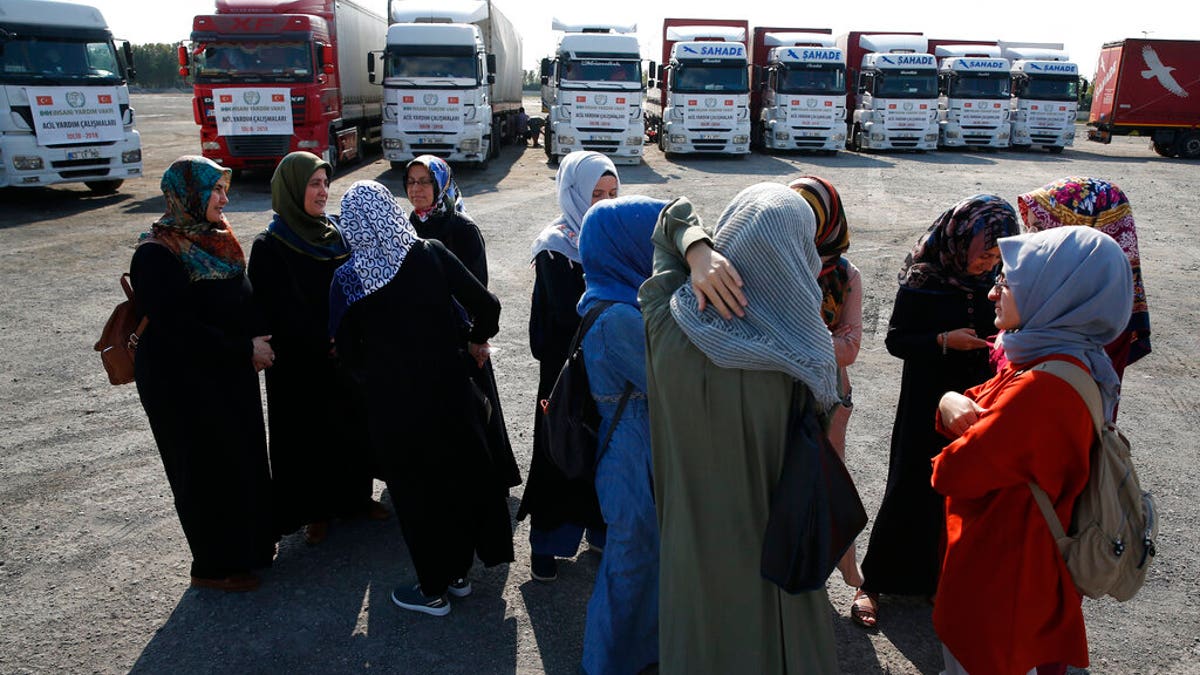The U.N. Security Council on Saturday passed a resolution authorizing a Syrian aid program that will deliver aid to the rebel-held northwest via just one border crossing -- after previous efforts to authorize more crossings were torpedoed by vetoes from Russia and China.
The resolution received 12 votes in favor and three abstentions (including China and Russia). It needed nine votes to pass and no vetoes. It will renew the Syrian cross-border aid program, which expired Friday, but only via a single border crossing in the northwest.
RUSSIA, CHINA BLOCK LATEST UN SECURITY COUNCIL ATTEMPT TO EXTEND SYRIA CROSS-BORDER AID PROGRAM
The program allows aid to be funneled into Syria by keeping open crossings on the borders in the north of the war-torn country. Russia in January vetoed a resolution that would see four crossings opened and forced the council to pass a resolution that reduced it to just two in the northwest on the border with Turkey: Bab al-Salam and Bab al-Hawa.

FILE - In this Sept. 10, 2018 file photo, members of a Turkish pro-government aid group, wait for the departure of trucks carrying humanitarian aid destined for Idlib, Syria, in Istanbul. (AP Photo/Lefteris Pitarakis, File)
Humanitarian groups and officials had warned of a humanitarian catastrophe if the program was allowed to expire, particularly with the COVID-19 outbreak -- and U.S. Ambassador Kelly Craft last week told Fox News there could be "mass graves" if Russia didn't drop its opposition to it being extended.
RUSSIAN RESOLUTION TO CUT US-BACKED SYRIAN CROSS-BORDER AID PROGRAM FAILS AT UN SECURITY COUNCIL
A majority at the council, including the U.S., wanted both those crossings extended, and a third crossing -- Al Yarubiyah -- opened on the northeast border with Iraq in order to get aid to an estimated 1.3 million stranded Syrians in need of medical supplies.
Al Yarubiyah was removed from the resolution to overcome a Russian veto, but Russia and China still wielded their vetoes twice, on Tuesday and on Friday. Russian drafted amendments and resolutions, meanwhile, were repeatedly shot down overwhelmingly, with no need for vetoes.
Saturday’s resolution keeps Bab al-Hawa open for 12 months, but it means Bab al-Salam will close, and there will be no border crossing open in the northeast.
Craft, who had visited the refugee camps in March, said it was a victory that Bab al-Hawa was kept open, but expressed disappointment at the loss of the other two crossings.
“To be clear, today’s outcome leaves us sickened and outraged at the loss of the Bab Al Salam and Al Yaroubia border crossings. Behind those locked gates are millions of women, children, and men who believed that the world had heard their pleas. Their health and welfare are now at great risk,” she said.
UN AMBASSADOR CRAFT WARNS OF 'MASS GRAVES' IF RUSSIA WON'T BACK DOWN IN SYRIAN AID IMPASSE
“Yet there is no question that the Council’s authorization of cross-border humanitarian access through Bab al-Hawa for 12 months is a victory in light of the Russian Federation and the People’s Republic of China’s willingness to use their veto to compel a dramatic reduction in humanitarian assistance,” she said.
Secretary Antonio Guterres, meanwhile, said that the reauthorization would ensure assistance for 2.8 million people in the northwest.
“The Secretary-General also reiterates his call on all parties to the conflict to ensure humanitarian access to all people in need in accordance with international humanitarian law,” spokesman Stephane Dujarric said.
Russia, meanwhile, claimed that “the cross-border mechanism was used by some external players as a tool to freeze dividing lines in Syria thus jeopardizing integrity of Syria breaking apart its regions.”
“It contradicts the principle of respect for the sovereignty and territorial integrity of the Syrian Arab Republic, which has been repeatedly confirmed in the Security Council resolutions, including this resolution,” Russian Ambassador Vassily Nebenzia said in an explanation of its vote.
The Russian and Chinese blockage of broader resolutions also saw criticism from humanitarian groups.
“The cynical and cruel maneuvering of Russia with China’s support is one more tragic example of the broken U.N. humanitarian system, and a defamation of the Security Council's charter,” Susannah Sirkin, director of policy at the U.S.-based Physicians for Human Rights, said in a statement. “ Exercising their veto over the will of the Council and succeeding in closing one critical border crossing risks cutting off life-saving aid to more than four million Syrians.”
CLICK HERE FOR THE FOX NEWS APP
The negotiations make clear the difficulties the U.S and other countries face in overcoming opposition from Russia in particular -- Syrian dictator Bashar al-Assad’s closest ally -- to pass Syria-related resolutions at the Security Council given Russia's veto power.
The Friday vetoes mark the 15th and 16th veto by Russia of a Syria resolution since the Syrian conflict began in 2011 and the ninth and 10th by China.
Fox News’ Ben Evansky and The Associated Press contributed to this report.













































